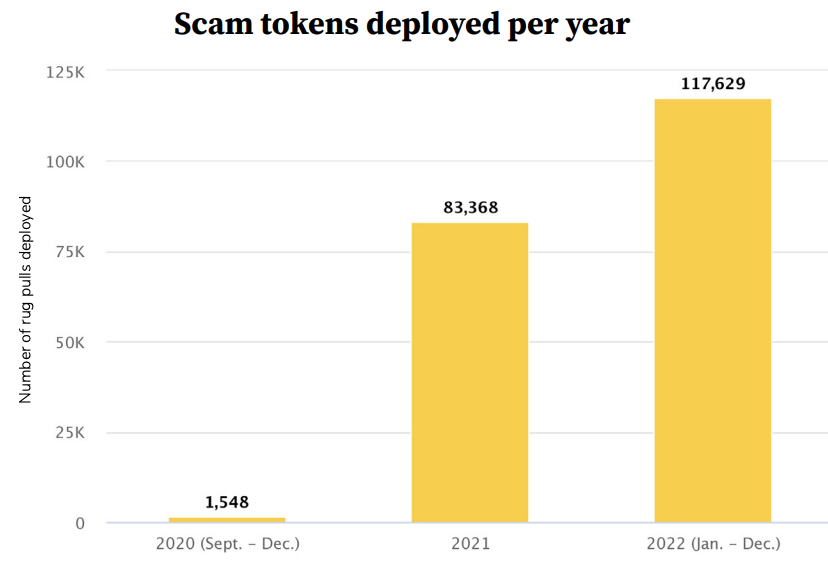Crypto Adds Unsavory Footnote to Dreadful 2022: Year of the Rug Pull

The year 2022 is likely to go down as one of the worst ever in the blockchain industry’s volatile history.
But for scammers trolling digital-asset markets for suckers or even easy pickings from savvy crypto traders, it’s been a banner year.
A new report from blockchain risk monitoring firm Solidus Labs shows that fraudsters deployed over 117,000 scam tokens from Jan. 1 to Dec. 1, 2022, a 41% increase over the full 2021.

Chart shows fraudsters deployed over 117,000 scam tokens from January through Dec. 1, a 41% increase over the full 2021. (Solidus Labs).
The study also revealed that 8% of all Ethereum tokens are programmed to execute rug pulls, while 12% of all BNB Chain tokens are alleged to be scams.
According to Solidus Labs, many of the scammers behind these tokens use crypto-to-fiat exchanges to both seed their scams and launder their proceeds.
“These fraudsters – benefiting from the fact that more than 99% of their malicious tokens have evaded detection under traditional approaches to scam identification – deposited and withdrew a combined $11 billion worth of ETH to/from 153 different centralized finance [CeFi] exchanges during the time period we studied,” the report read.
The scam tokens deployed in 2022 brings the total since September 2020 to more than 200,000, based on the tally by Solidus Labs, and almost 2 million investors have lost funds to rug pull tokens.
Hidden theft
One common scheme is known as the “rug pull” and involves “creating a token, funding the liquidity pool, and then removing all the liquidity after an initial rush of people buy the token,” as described by Riyad Carey, research analyst at crypto data firm Kaiko.
But why have the majority of rug pulls gone undetected in the past, and why aren’t these tokens counted on crypto pricing sites that mostly put the number of digital assets in existence at around 20,000?
Solidus Labs Chief Operating Officer Chen Arad pointed out that not all tokens deployed on blockchains are listed on pricing data sites because they’re not verified.
The number of cryptocurrencies tracked by data tracker CoinMarketCap reached over 22,000 as of today, but many existing tokens didn’t meet the site’s listing guidelines. They may still be featured on the site as untracked listings or unverified listings, including over 145,000 Ethereum ERC-20 tokens and 1.2 million BNB Chain BEP-20 tokens.
Arad told CoinDesk in an emailed comment that the report’s data is based on “continuously scanning smart contracts as they’re deployed on blockchains and flagging the token smart contracts that are hard-coded to scam users.”
According to the study, in many rug pull cases, the theft occurs exclusively on-chain: “The scam is encoded in the token’s smart contract, the token is traded on a decentralized exchange, and the scammer’s illicit profits are denominated in crypto, not fiat currency.”
The study identified a “hard rug pull” as a token scam where the scammer programs their token to steal from investors.
Another type is called “soft rug pull,” or an exit scam where the scammer promotes their token to steal from investors by publishing misleading marketing websites and roadmaps, announcing fake partnerships, or using bots to manufacture trading activity, according to the report.
Solidus Labs said 2021’s dizzying rise-and-fall of the Squid Game token was an example of the combination of two types of rug pulls: The project was a “honeypot” that prevents buyers from reselling their tokens, while having its own “marketing website, whitepaper, and promotional video.”
The hidden theft phenomenon reveals “significant gaps in consumer protection, anti-money laundering and crypto market integrity,” the report added.
The Solidus Labs report is directionally consistent with separate data from Comparitech suggesting that the number of rug pulls climbed to at least 262 this year, more than five times the number in 2021.






 Bitcoin
Bitcoin  Ethereum
Ethereum  Tether
Tether  USDC
USDC  TRON
TRON  Dogecoin
Dogecoin  Cardano
Cardano  Bitcoin Cash
Bitcoin Cash  Chainlink
Chainlink  Monero
Monero  LEO Token
LEO Token  Stellar
Stellar  Zcash
Zcash  Litecoin
Litecoin  Hedera
Hedera  Dai
Dai  Cronos
Cronos  Tether Gold
Tether Gold  OKB
OKB  Ethereum Classic
Ethereum Classic  KuCoin
KuCoin  Cosmos Hub
Cosmos Hub  Gate
Gate  Algorand
Algorand  VeChain
VeChain  Stacks
Stacks  Tezos
Tezos  TrueUSD
TrueUSD  Dash
Dash  IOTA
IOTA  Theta Network
Theta Network  Basic Attention
Basic Attention  NEO
NEO  Decred
Decred  Synthetix
Synthetix  Qtum
Qtum  Ravencoin
Ravencoin  0x Protocol
0x Protocol  DigiByte
DigiByte  Zilliqa
Zilliqa  Nano
Nano  Holo
Holo  Siacoin
Siacoin  Numeraire
Numeraire  Waves
Waves  Status
Status  Ontology
Ontology  Enjin Coin
Enjin Coin  Hive
Hive  BUSD
BUSD  Pax Dollar
Pax Dollar  Lisk
Lisk  Steem
Steem  Huobi
Huobi  OMG Network
OMG Network  NEM
NEM  Bitcoin Gold
Bitcoin Gold  Augur
Augur  Bitcoin Diamond
Bitcoin Diamond